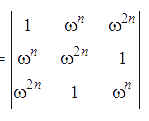Let ω≠1 be cube root of unity and S be the set of all non-singular matrices of the form [1abω1cω2ω1],where each of a,b,andc is either ωorω2. Then the number of distinct matrices in the set S is a. 2 b. 6 c. 4 d. 8
Step by step video & image solution for Let omega!=1 be cube root of unity and S be the set of all non-singular matrices of the form [1a bomega1comega^2omega1],w h e r e each of a ,b ,a n dc is either omegaoromega^2dot Then the number of distinct matrices in the set S is a. 2 b. 6 c. 4 d. 8 by Maths experts to help you in doubts & scoring excellent marks in Class 12 exams.
Updated on:21/07/2023Similar Questions
Let ω≠1 be cube root of unity and S be the set of all non-singular matrices of the form ⎡⎢⎣1abω1cω2ω1⎤⎥⎦, where each of a,b,andc is either ω or ω2. Then the number of distinct matrices in the set S is (a) 2 (b) 6 (c) 4 (d) 8
View SolutionIf ω is a cube root of unity, then
1+ω2= …..
View SolutionIf ω is a cube root of unity, then find the value of the following: (1+ω−ω2)(1−ω+ω2)
View SolutionWith 1,ω,ω2 as cube roots of unity, inverse of which of the following matrices exists?
View SolutionIf ω is a cube root of unity, then find the value of the following: (1−ω)(1−ω2)(1−ω4)(1−ω8)
View SolutionIf ω≠1 is a cube root of unity and a+b=21, a3+b3=105, then the value of (aω2+bω)(aω+bω2) is be equal to
View SolutionIf ω is a cube root of unity and (1+ω)7=A+Bω then find the values of AandB
View SolutionIf ω is a complex cube roots of unity, then find the value of the (1+ω)(1+ω2)(1+ω4)(1+ω8)… to 2n factors.
View SolutionIf 1,ω,ω2 are the cube roots of unity, then △

is equal to.....
View SolutionIf ω is a cube root of unity but not equal to 1, then minimum value of ∣∣a+bω+cω2∣∣, (where a,b and c are integers but not all equal ), is
View Solution